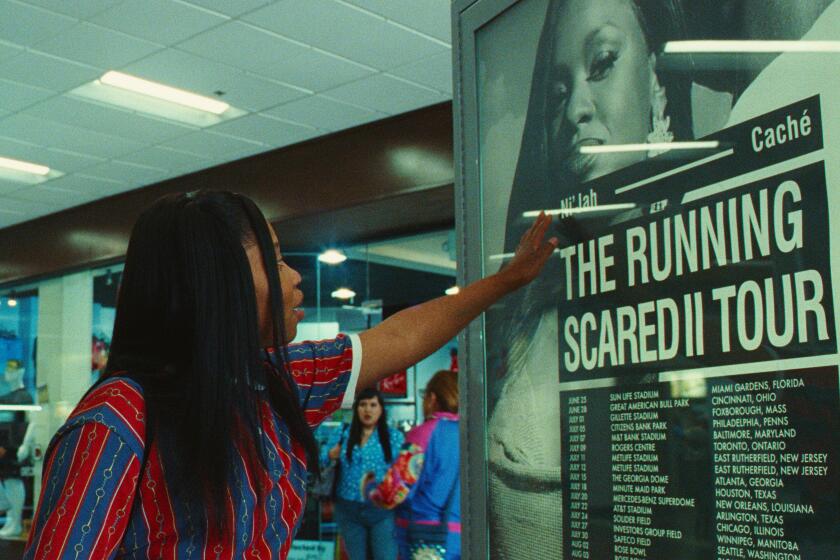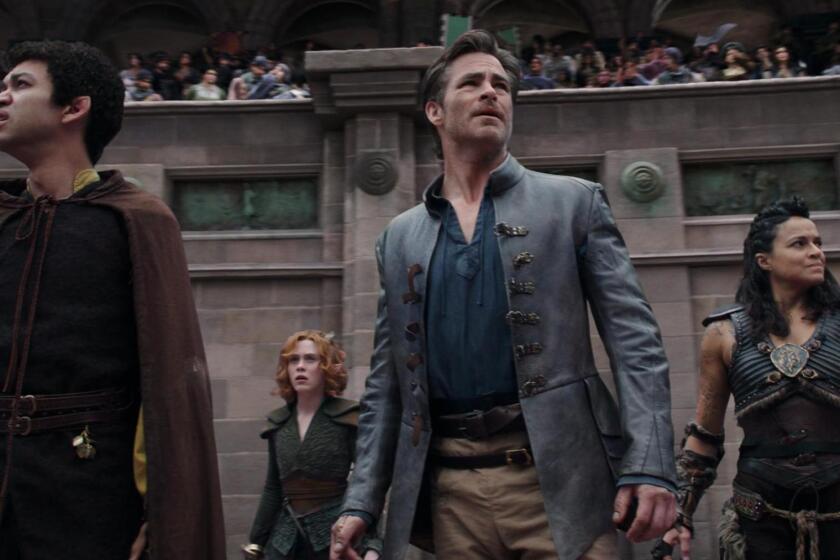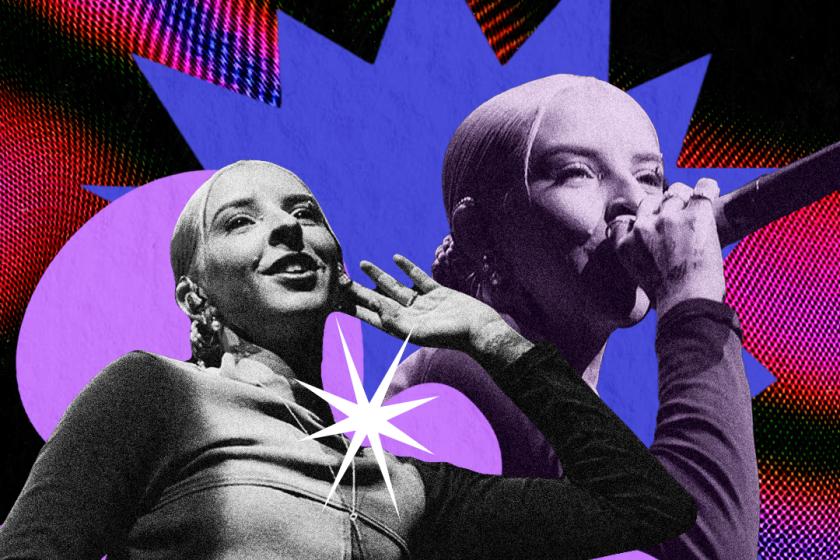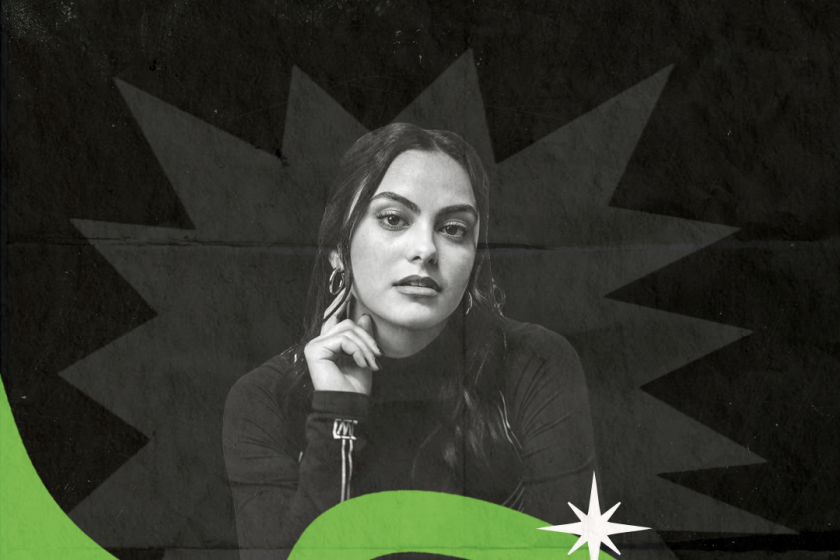The reigning queen of SXSW is feeling the ‘pressure’: ‘Did they like that?’
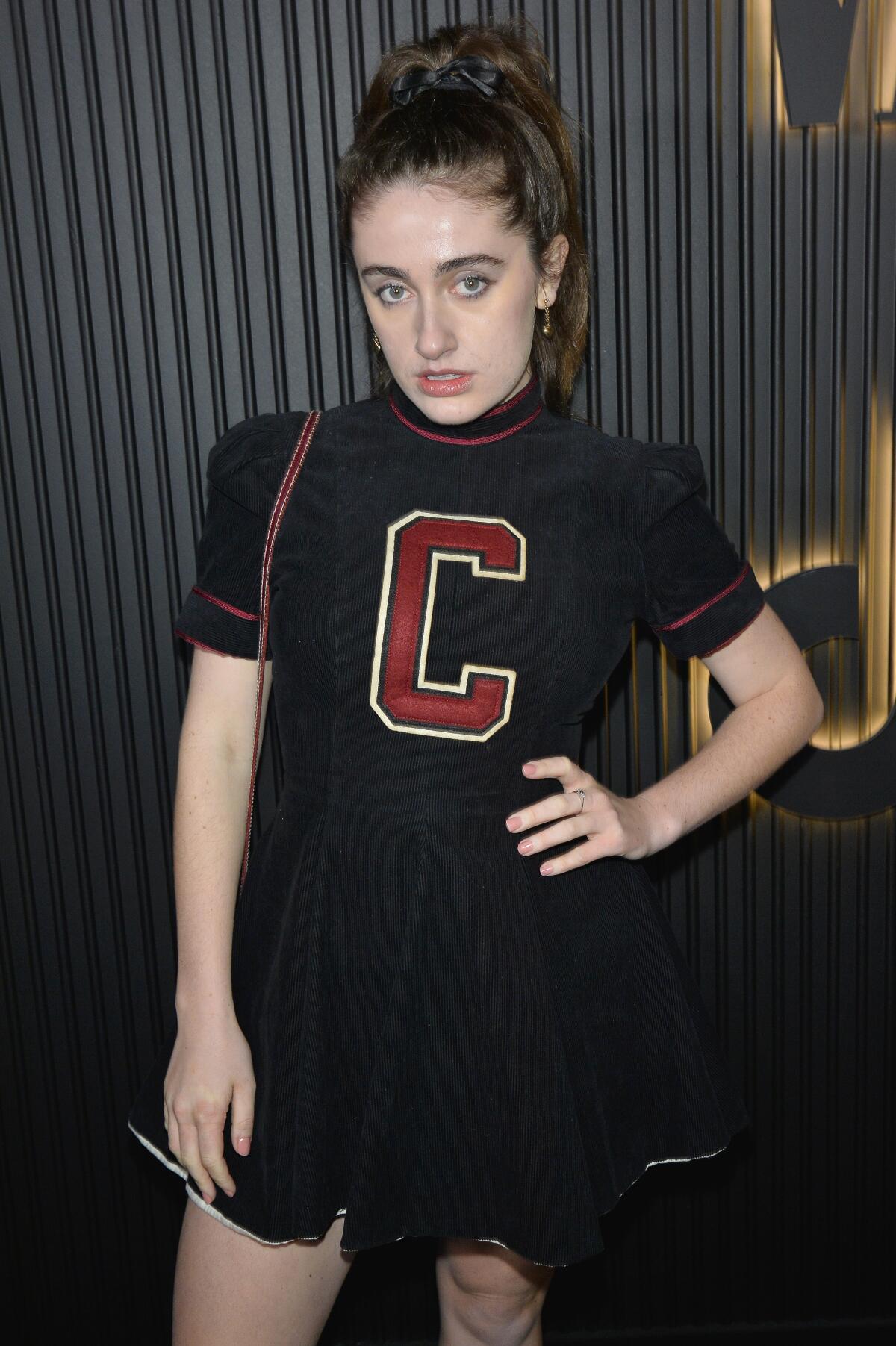
- Share via
As Parker Posey was to Sundance in the ‘90s and Greta Gerwig to SXSW in the mid-aughts, no one embodies the current sensibility of the South by Southwest Film & TV Festival quite like Rachel Sennott. With a persona that is ditzy but knowing, somehow earnestly cynical, tuned in but offbeat, she is at the festival this year with two new films.
“Bottoms,” described as the story of two queer high school girls who start a fight club to pull in cheerleaders, was co-written by Sennott and her “Shiva Baby” collaborator Emma Seligman. Its Saturday night premiere is among the most anticipated events of the festival. “I Used to Be Funny,” written and directed by Ally Pankiw and playing the narrative feature competition, is the story of a young woman dealing with trauma and post-traumatic stress disorder and shows a previously unseen dramatic side to Sennott’s talents.
Having been to the 2018 festival with the short film version of the anxiety-inducing comedy “Shiva Baby” — the feature version played the 2020 festival, which had its in-person edition canceled in the early days of the COVID-19 pandemic — Sennott was also there last year with her scene-stealing performance in “Bodies Bodies Bodies.”
For a phone interview ahead of the festival, Sennott was on the line from, as she put it, “Tennessee, randomly,” where she is shooting the upcoming “Holland, Michigan,” directed by Mimi Cave and co-starring the formidable trio of Nicole Kidman, Gael García Bernal and Matthew Macfadyen
With a SXSW title, ‘Everything Everywhere All at Once,’ a strong contender for Oscars, the Austin, Texas-based festival returns with a feather in its cap.
She was very excited to be returning to SXSW.
“It honestly means so much,” said Sennott. “When I first went there, I think I just opened up my eyes so much to indie filmmaking and also realizing that movie makers were just people who wanted to make something with their friends. It was really inspiring for Emma and I and very motivational for writing ‘Bottoms.’
“And I felt it last year for ‘Bodies’ where I was like, ‘Oh my God. I only want to watch any movie ever with this room of people,’” Sennott said. “It completely changed the experience where everyone sowanted to watch a movie and laugh and cheer. The energy, it’s something that I’ve really missed in the past couple of years. I love watching films that way and I feel like both ‘Bottoms’ and ‘I Used to Be Funny’ are meant to be experienced that way with other people.”
Despite missing out on an in-person festival premiere, the feature version of “Shiva Baby” went on to become a pandemic-era art house hit, earning Sennott a Gotham Award nomination for breakthrough performer and winning the Spirit Awards’ John Cassavetes prize, which recognizes low-budget films.
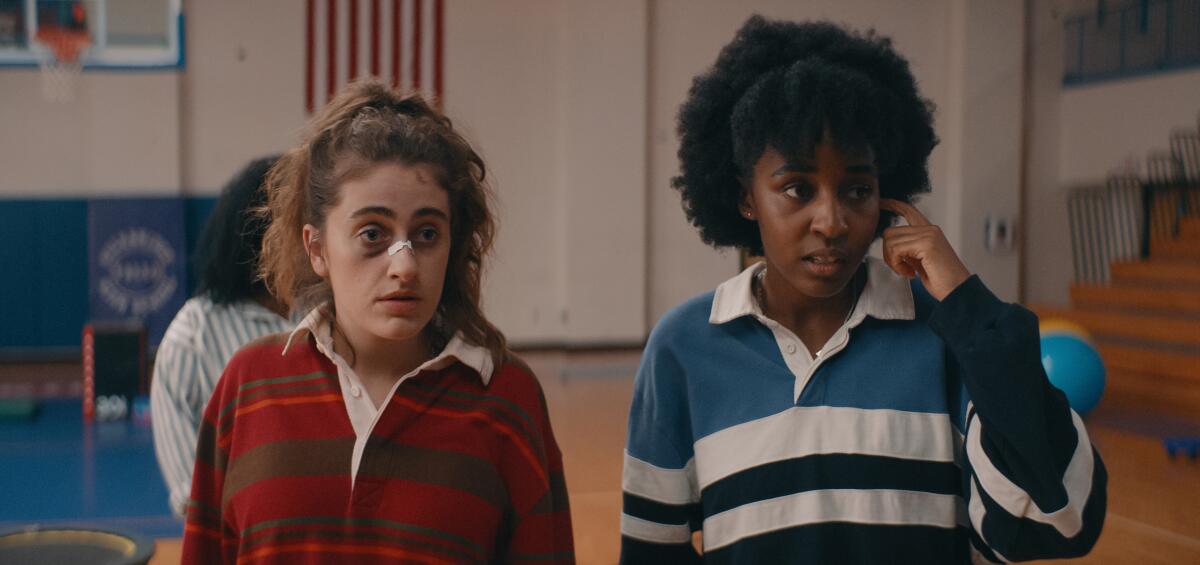
While “Shiva Baby” and “Bodies Bodies Bodies” firmly established her comedic persona, Sennott is energized, if a bit anxious, about showing off other aspects of her talent at this year’s festival, starting with the fact that she shares writing credit on “Bottoms.”
“This is the first movie that I’ve written that has been made,” said Sennott. “There’s an added pressure because all of a sudden not only are you worried about what people think of your performance, every line you’re like, ‘Did they like that? Did they like this?’
Donald Glover and ‘Atlanta’ scribe Janine Nabers’ latest show, ‘Swarm,’ offers an ‘American Psycho’ take on stan culture.
“For ‘I Used to Be Funny,’ there are really funny moments in that script, but there’s also more dramatic moments and I think it deals with serious subject matter and, not that I haven’t done that, but I think on this specific level or this subject matter, I haven’t.”
In “I Used to Be Funny,” which premieres Monday, Sennott plays Sam, an aspiring stand-up comedian who has shut down in the aftermath of a traumatic incident and the young girl Brooke (Olga Petsa) she used to nanny for going missing. Told with a bold, cut-up storytelling sensibility, the film draws from Sennott’s comedic persona while finding her exploring new emotional depths.
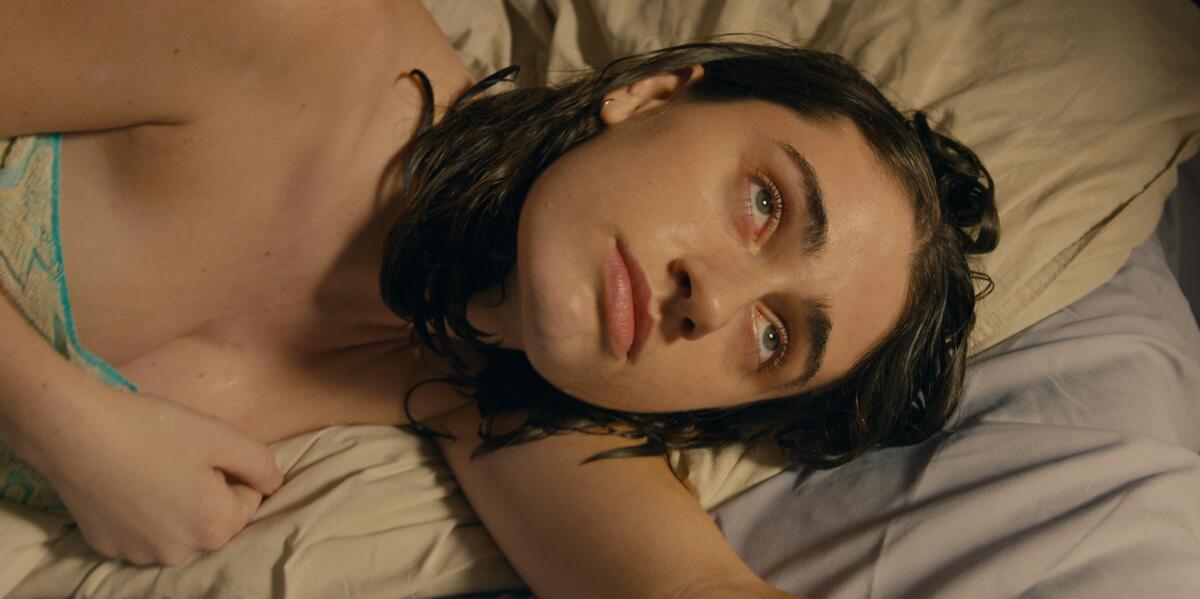
“I wanted to show what’s taken away from women. Their sense of humor, their connection to the world, their joy, it’s stripped away and no one starts out that way,” Pankiw said. “The world just kind of makes them that way.
“Often when you meet people with PTSD or who have been traumatized, that’s the version you meet first, like the earliest iteration of Rachel in the film,” Pankiw said. “And it’s such a shame that most people don’t get to know the person that people were before their trauma. Rachel does such a good job of bringing so much vibrancy to the character and such a charm and such an inherent sweetness and you see all of that and that she was all these things and that she was pure potential. It’s like a reverse sort of likability.”
Pankiw, who makes her feature debut with the film, has directed episodes on series such as “Shrill” and “The Great” as well as many music videos, including “Silk Chiffon” by Muna featuring Phoebe Bridgers. She first saw Sennott do stand-up and recalls thinking, “This girl is so funny and brilliant and charming. I just sort of filed her away in my head for future reference.”

After seeing “Shiva Baby” at Outfest while she was trying to get the project that became “I Used to Be Funny” off the ground, Pankiw discovered both she and Sennott were represented by the same agency, WME.
“I think I had written the character a little bit harsher, and Rachel just has this sweetness to her, she just can melt your heart,” said Pankiw. “It was such a miracle that we got her and she also brought a lot of that element of the character to the forefront that I think it really needed. I often joke that she did this film for me and I would now get hit by a bus for her.”
‘Dungeons & Dragons: Honor Among Thieves’ launches the SXSW Film Festival and is the latest attempt to adapt the popular role playing game. Earlier films have been poorly received, but the latest lands at a time when the game is enjoying a renaissance.
Sennott’s character in “I Used to Be Funny” is an aspiring stand-up comedian who has found it difficult to perform since her traumatic event. Sennott and Pankiw collaborated on the stand-up routines in the film. Pankiw recalled Sennott rehearsing in the kitchen of the apartment she was staying at in Toronto for the production, using a spatula as a microphone as she worked on the material.
For Sennott it was a new challenge to do stand-up in character.
“Honestly, it was so wild,” she said. “I’m writing jokes that are about my nannying job and living in Toronto or being from Canada or whatever. And I did it in front of real people. There were these two girls who knew who I was and they were kind of like, ‘You’re Canadian?’ after the show. And I was like, ‘No, I’m a liar. I’m just a liar.’ ”
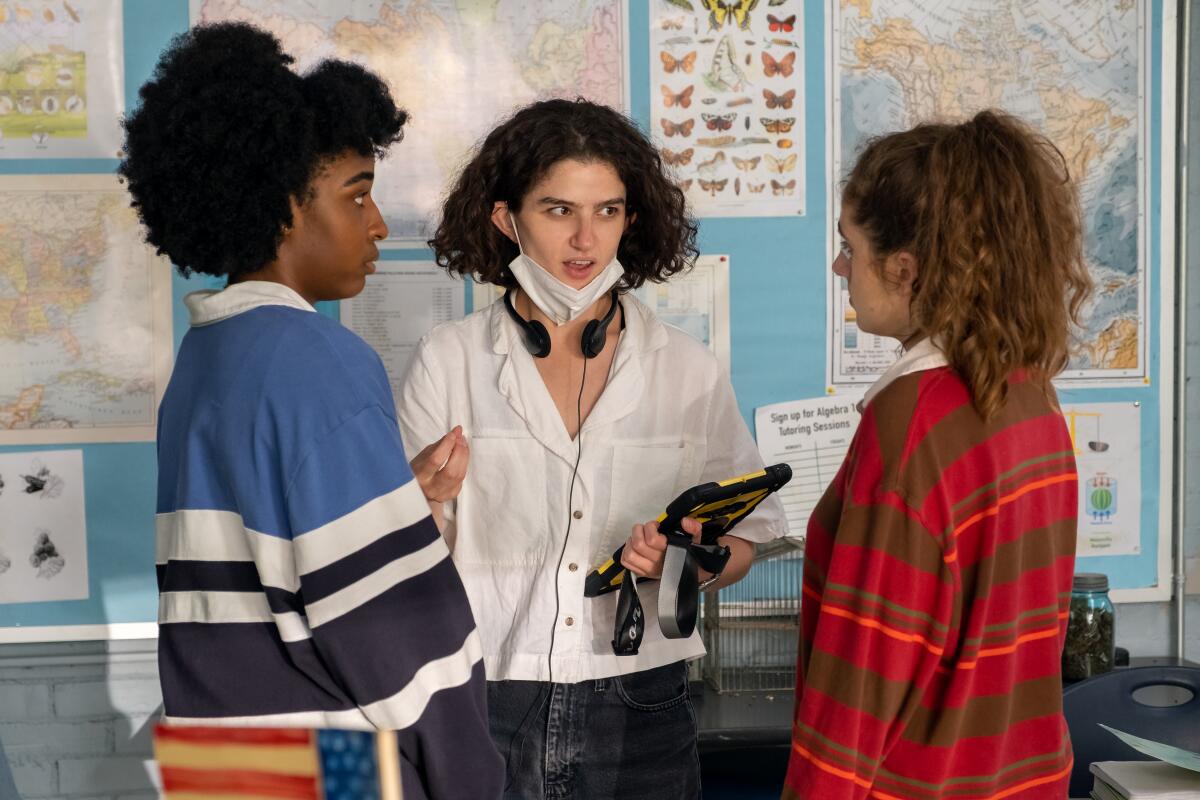
“Bottoms” found Sennott working with not only her “Shiva Baby” collaborator in Seligman, but also co-star Ayo Edebiri, with whom she had a short-lived Comedy Central series, “Ayo and Rachel Are Single.” Seligman and Sennott wrote the part in “Bottoms” with Edebiri in mind and pitched her on it before they had even completed a draft of the script.
“To finally get to the place where we were all making it together was like, ‘Whoa,’” Sennott said. “Ayo and I did so many little sketches together in school and we made this little Comedy Central series for no money and we did stand-up in basements and so to get to perform together again, but actually on a movie with a budget where we’re fighting each other and there’s stunts was really cool.
“Not to sound corny, but I was like, ‘We did it! We’re here!’ ” said Sennott. “We were in New Orleans with the stunt coordinator kicking each other in the face. We did it.”
For Pankiw, Sennott’s truest gift is how she makes it seem like she isn’t doing anything at all, the naturalistic hanging-out vibes she brings to a role.
“What she’s doing is she’s tricking people into thinking that what she does is effortless, but she is an incredibly gifted technician as an actress,” said Pankiw. “And I think because people have seen her mainly in comedic roles, unfortunately sometimes the misconception is that’s very easy if someone is like their character. But I think she’s more of a chameleon than people know.”
Originally from Connecticut, Sennott went to college in New York City, began her career there and finds she is still very much identified as a New Yorker, even though she has been living in Los Angeles.
“I feel like I give off New York,” Sennott said. “I do really like L.A. It’s growing on me and I gotta tell you the experience of grocery shopping in L.A., unbeatable. Sorry, New York, but grocery shopping in L.A. is incredible.”
Sennott is trying to take in how much has happened to her and her career over the last few years, from the success of “Shiva Baby” to shooting her first scene with Nicole Kidman — “A f— legend,” she enthused — to anticipating the response to both “I Used to Be Funny” and “Bottoms.”
“I honestly feel like COVID in the last couple of years, my emotions are like in a delay,” said Sennott. “Because so much of it happened in a way where you don’t realize it on a day-to-day basis. And then it happens in these random little bursts where I feel it in those moments.
“I feel grateful [“Shiva Baby”] got to have this online groundswell of this community of mostly young women who were supporting the movie,” Sennott said. “If I ever see a 25-year-old girl with a Twitter account who’s like, ‘I loved your movie,’ I’m like, ‘You are the reason that anyone saw it, so thank you.’ ”
More to Read
Only good movies
Get the Indie Focus newsletter, Mark Olsen's weekly guide to the world of cinema.
You may occasionally receive promotional content from the Los Angeles Times.

